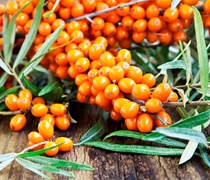 Have you ever heard of sea-buckthorn berries? They grow all across Europe and Asia and have been used for centuries for medicinal purposes. Though sea-buckhorn berries have a rather sour, bitter taste, they are an exceptionally nutritious berry.
Have you ever heard of sea-buckthorn berries? They grow all across Europe and Asia and have been used for centuries for medicinal purposes. Though sea-buckhorn berries have a rather sour, bitter taste, they are an exceptionally nutritious berry.
Asians and Europeans eat these bright orange fruits as a juice (sweetened with grape or apple juice) and in pies and jams. Even Russian cosmonauts have been given the berries to eat while in orbit. Sea-buckthorn berries contain high levels of antioxidants, vitamin C, vitamin A, vitamin E, and healthy oils.
Traditionally, sea-buckthorn berries have been used to treat canker sores, ulcers, and colitis, and topically to treat burn injuries. It seems that inflammatory conditions can now be added to this list, according to a new study published in the”European Journal of Clinical Nutrition.”
Because of their high antioxidant and vitamin C content, Finnish researchers wanted to find out if sea-buckthorn berries could help fight the common cold and digestive tract infections. The results of the study were not promising for these two cures. But what the researchers did find out was that the berries helped reduce symptoms associated with inflammation, diabetes, and heart disease.
During the study, 233 healthy participants were given either sea-buckthorn or a placebo product for 90 days. The sea-buckthorn group received 28 g of frozen berry puree. This daily dose contained 16.7 mg of flavonoids, 15.6 mg of vitamin C, and 1.1 mg of vitamin E. “A moderate berry dose was chosen to have a realistic dose for everyday consumption of the average person,” said lead author Petra Larmo, from the University of Turku.
The researchers discovered that the sea-buckthorn reduced the level of a protein called C-reactive protein, or CRP. It turns out that CRP is a marker of inflammation. It shows up in the body when there is a risk of developing type-2 diabetes and cardiovascular disease. CRP is produced in the liver. Levels of CRP dropped an average of 0.059 mg/l in the sea-buckthorn group.
About 19 million people are affected by diabetes in Europe, while cardiovascular disease is responsible for 50% of all deaths. The researchers hope that sea-buckthorn can be used as a preventative measure in the development of these two diseases.
